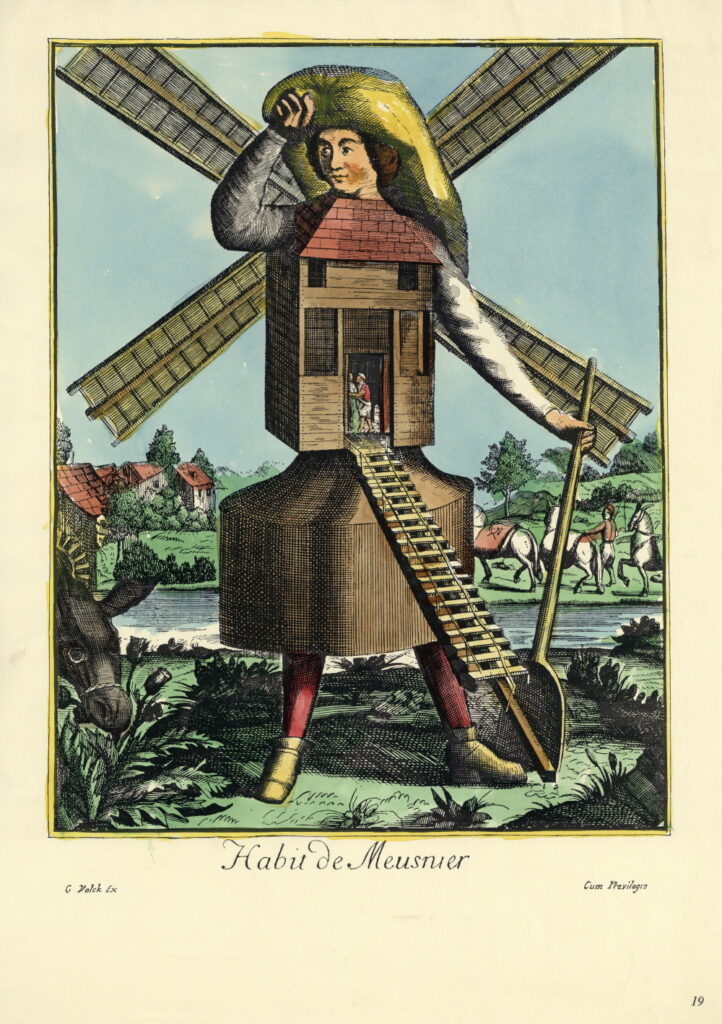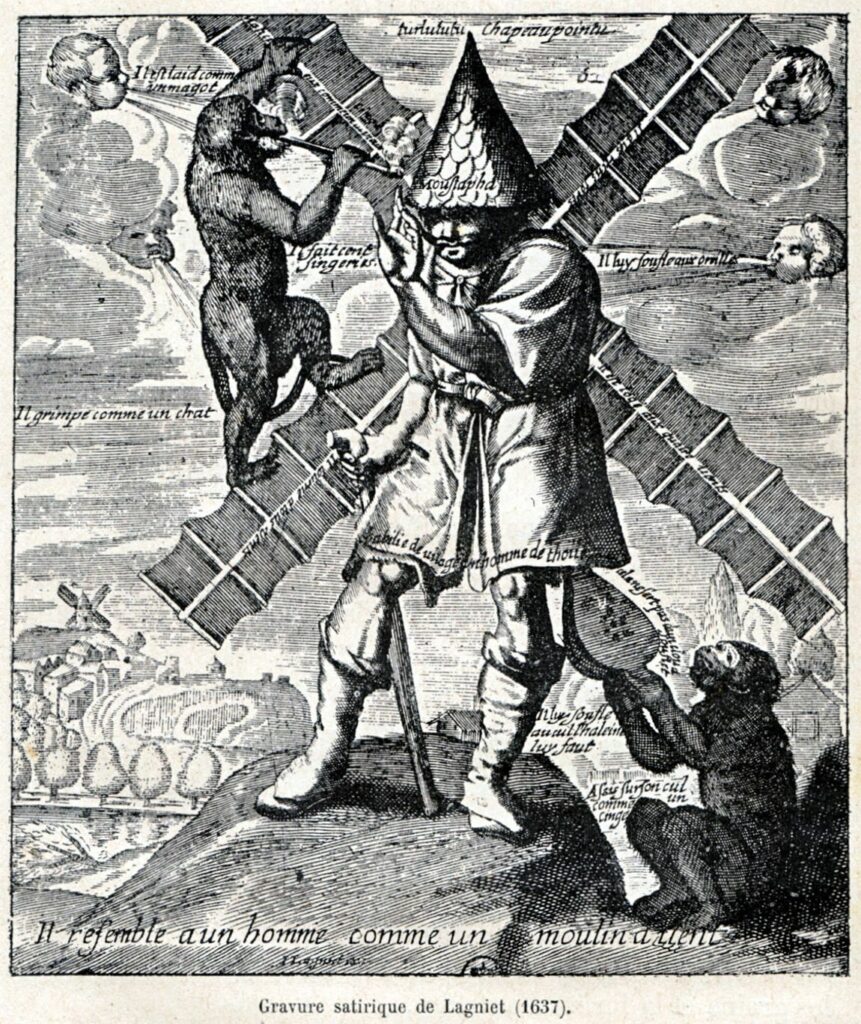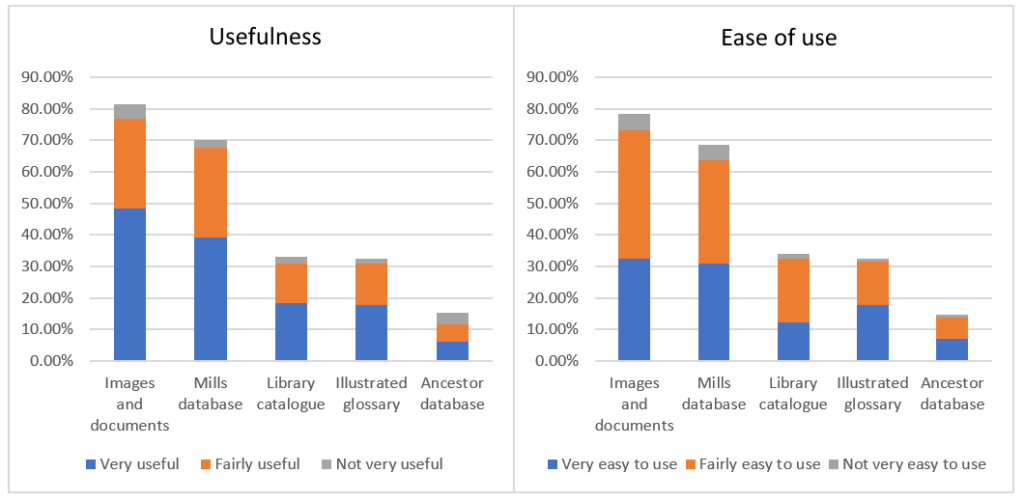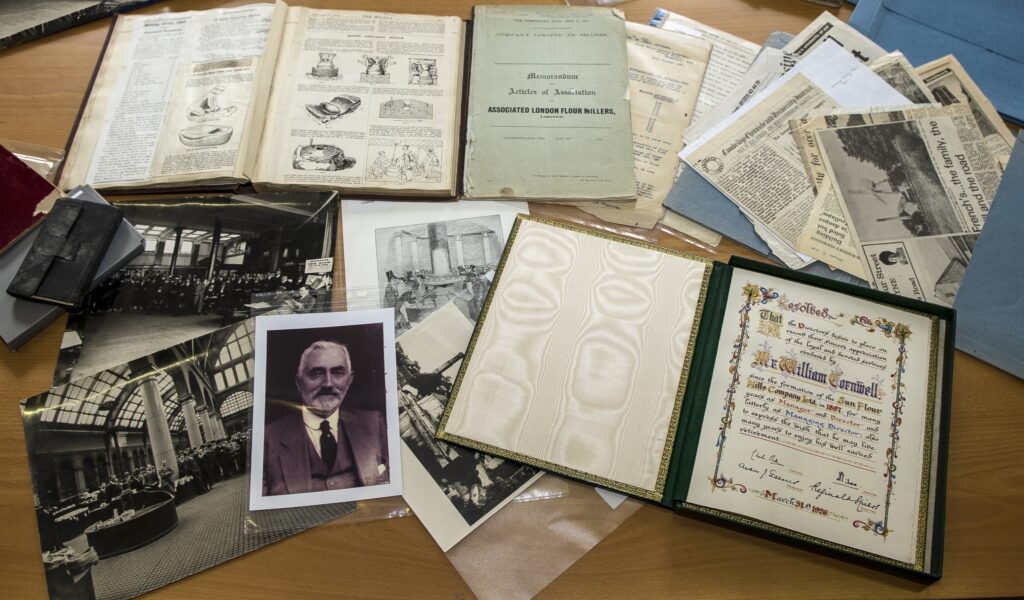‘Mill people’ images
| Mills have often been a popular theme for artworks, ranging from realistic depictions to some of the more unusual symbolic and allegorical uses of milling imagery. There are not many mill images however which are as strange as the ones shown here. For want of a better term we could call them ‘anthropomorphic windmills’ – windmills which are simultaneously people. This appears to have been a fairly uncommon theme, but if you know of any other examples, do get in touch. |

| This image shows the ‘Habit de Meusnier’ (costume of a miller) – part of a series of “Costumes Grotesques” in which a range of different trades are portrayed in fanciful costumes. They were designed by the printmaker Nicolas de Larmessin II in 1691 and a number can be viewed here: https://www.rouillac.com/en/auction-483-1000463-old_masters_and_drawings. The copy shown above is from the Mildred Cookson collection. |

| A satirical image by Jacques Lagniet (1620–1672) of a someone who ‘resembles a man like a windmill’. The word ‘Moustapha’ is written on his hat, making it likely this is intended to represent the Ottoman Sultan Mustafa I who reigned 1617-18 and then 1622-1623. He was known for his eccentric behaviour and was deposed twice, dying in 1639. |

| This grotesque windmill/human head is a detail from the depiction of gluttony in the series of images by Pieter Bruegel the Elder (c 1525-1569) depicting the seven deadly sins – you can see them all here: http://janbrueghel.net/pieterbruegel/series/the-seven-deadly-sins/. If you’ve come across any other anthropomorphic mills, let us know! |
Website survey

Getting feedback on our work is always useful as it helps us to improve, and we would like to thank everyone who took part in our website survey. There were many positive comments from those who have found our resources helpful – here are a few of them:
Found a lot of relevant information
I received excellent service
Keep up the good work
Impressive range
Clearly, it is a very useful resource for molinologists
Very informative
We were also interested to note that some who responded said they haven’t actually used the website, but enjoy receiving the newsletters. In whatever way you have benefitted from our resources, whether through the newsletters or the online databases, we are glad that we have been able to help and engage more people with milling history.

| We asked you to rate how useful and easy to use the different features of our website are. These graphs show the percentage of respondents to the survey who said they had used each feature, and how useful and easy to use they found it. Room for improvement There were also comments from some who have found it hard to find what they were looking for or have found the search facilities confusing. There is undoubtedly more we can do to improve the search on the site. If you have any further feedback or suggestions, or would like help to find relevant information and records, please get in touch by emailing archivist@millsarchive.org Some commented that larger images would be nice to have. At the moment we have restricted access to the full size images in our archive, but they can be purchased through the shop by selecting ‘purchase image’. This helps us to raise funds to contribute to the costs of caring for our collections. Members of our friends scheme receive a discount on image purchases – if you would like to join, or need help purchasing an image, please get in touch. |

Another suggestion was that we could include more up to date information about the current status of mills in the UK. Unfortunately keeping the database of 12,000 mills completely up to date would require more resources than are currently available to us. There is a database of existing UK mills on the SPAB site: https://www.spab.org.uk/mills/visit-a-mill, although it would always be wise to contact a mill directly before a planning a visit.
| Searching for ancestors We received quite a few comments on our Ancestor Database, even though it was also least used out of the various website features mentioned in the survey. Some who have not used it commented that they would like to, while another stated that it was the reason they came to the site. Respondents differed over the importance of the database, one stating that it should not be a core interest of the Archive, others suggesting we should continue to add to it, and some even offered details about their ancestors. If you have any thoughts or suggestions about the database, please get in touch. Additions to the site |

We are always adding new records to the site so it is always worth checking to see what is new. Thank you to those who send in additional details and images.
If you have anything you would like to contribute, please contact archivist@millsarchive.org (please note that the requirements of our collections policy and issues like copyright will impact our decisions about what items to accept).
| Thank you once again for all your feedback, and we look forward to exploring and sharing many more interesting mill stories in the future! |
